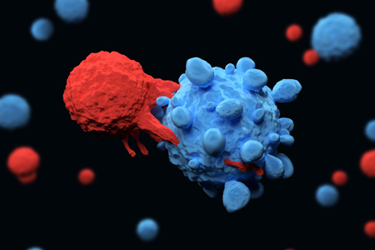The Future Looks Promising For CAR T-Cell Therapy
By Sabyasachi Ghosh, Future Market Insights

CAR T-cell therapy offers several crucial benefits over conventional drugs, including shortened treatment time, utilization of the patient's immune system to destroy cancer cells, and early recovery. CAR T-cell therapy is particularly employed to treat multiple myeloma blood cancer, lymphoma, and acute lymphocytic leukemia.
One of the significant advantages of CAR T-cell therapy is its long-lasting presence in the body, which contributes to its efficacy. It also can identify and target cancer cells, although there are some limitations and the cancer relapses. There is a high rate of adoption of CAR T-cell therapy products due to their various benefits over conventional drugs, which ultimately contributes to market growth.
A few key factors driving CAR T-cell therapy include the increasing prevalence of cancer, growing knowledge of CAR T-cell therapy medicines, surging demand for effective therapeutics to treat cancer, and favorable reimbursement policies in some economies.
These factors contribute greatly toward allowing the market to reach $6.82 billion with a CAGR of 6.9% from 2023 to 2033, according to a new analysis by Future Market Insights. Other factors anticipated to provide key opportunities for expanding the market include the increasing number of active clinical trials and the recent commercialization of several CAR T-cell therapies.
A study indicating that around 75% of blood cancer patients who undergo CAR T-cell therapy may require bone marrow transplants showcases the complexity of cancer treatment and highlights that CAR T-cell therapy may not be a stand-alone solution for all patients. This might influence the adoption of CAR T-cell therapies, as healthcare providers and patients weigh the potential benefits and risks, including the need for additional interventions.
Factors such as financial implications, reimbursement policies, long-term outcomes, and patient selection criteria are likely to play a role in shaping the market dynamics and the adoption of CAR T-cell therapies.
Based on drug type, the global market for CAR T-cell therapy is segmented into brexucabtagene autoleucel, axicabtagene ciloleucel, tisagenlecleucel, and others. The global market was led in 2022 by axicabtagene ciloleucel (Yescarta), a trend that is anticipated to grow in forthcoming years. The active ingredient in this medicine is effective in treating follicular lymphoma and diffuse large B-cell lymphoma, a factor that is expected to fuel the growth in this segment during the projected period.
Let’s look at regional analysis for the market and notable reimbursement policies around the world.
The U.S. Leads The CAR T-cell Therapy Market
The U.S. CAR T-cell therapy market is leading in terms of medical and pharmaceutical trials and novel approaches. So far, six CAR T-cell therapies have been approved by the FDA: Kymriah, Yescarta, Tecartus, Breyanzi, Abecma, and Carvykti. These have been approved for B-cell acute lymphoblastic leukemia and certain types of lymphoma patients.
European Commission Is Looking For CAR T-cell Therapy Options To Cure R/R
The progress of CAR T-cell therapy in Europe has shown significant variations across different regions, with countries like Spain and the United Kingdom leading the way in approvals while others, such as Romania and Slovakia, are still catching up. The development of CAR T-cell therapies in Europe is being driven by the rise in the number of active clinical studies for lymphoma, leukemia, and multiple myeloma.
Between August 2020 and March 2022, three new CAR T-cell treatments, in addition to the already-approved Yescarta and Kymriah, acquired regulatory clearance from the European Medicines Agency (EMA). These novel treatments include Tecartus, Breyanzi, and Abcema (authorized in 2020, 2021, and 2022 respectively). These EMA approvals have increased the variety of CAR T-cell therapy alternatives accessible in Europe and opened new therapeutic options for certain purposes.
Breyanzi (lisocabtagene maraleucel; liso-cel), a CD19-directed CAR T-cell therapy, was approved by the European Commission for the treatment of relapsed or refractory diffuse large B-cell lymphoma (DLBCL), high-grade B-cell lymphoma (HGBCL), primary mediastinal large B-cell lymphoma (PMBCL), and FL3B.
The Phase 3 TRANSFORM study showed Breyanzi outperformed conventional treatment, leading to this regulatory clearance. Breyanzi outperformed conventional therapy with a tripled median event-free survival (EFS) and a 73.9% complete response (CR) rate in the TRANSFORM study. CAR T-cell therapy, specifically Breyanzi, has the potential to improve patient outcomes and give a tailored therapeutic strategy for relapsed or refractory DLBCL.
The approval of Breyanzi and its positive clinical outcomes reinforce the growing market potential for CAR T-cell therapies in Europe. It not only provides a differentiated treatment option for patients with relapsed or refractory DLBCL but also positions Bristol Myers Squibb as a key player in the CAR T-cell therapy market, further strengthening its position as a leading manufacturer in the field. This development paves the way for increased adoption and utilization of CAR T-cell therapies, highlighting the continued growth and advancement of this transformative treatment modality in Europe.
Notable Favorable Reimbursement Policies For CAR T-Cell Therapy
Favorable reimbursement policies can play a crucial role in driving the adoption and accessibility of CAR T-cell therapies in different economies. Reimbursement policies determine the extent to which healthcare providers and insurance systems cover the cost of these therapies, which can significantly impact their uptake and affordability.
The Centers for Medicare and Medicaid Services (CMS) in the United States has authorized CAR T-cell treatment payment coverage for several medical conditions. Medicare, a federal health insurance program largely for seniors 65 and older, began to cover CAR T-cell treatment for a few cancers, including juvenile acute lymphoblastic leukemia and relapsed or refractory large B-cell lymphoma. Private insurance companies in the U.S. also provide coverage for CAR T-cell therapy, although specific policies and coverage criteria may vary.
In Europe, the reimbursement landscape for CAR T-cell therapy varies across different countries. Several European countries, including Germany, France, and the United Kingdom, have implemented reimbursement schemes for CAR T-cell therapies such as Kymriah and Yescarta. These schemes often involve negotiation between the manufacturers and national health authorities to establish pricing and reimbursement arrangements.
Other notable economies that have shown favorable reimbursement policies for CAR T-cell therapy include Canada, where reimbursement has been granted for certain indications, and Australia, where CAR T-cell therapy has been listed on the Pharmaceutical Benefits Scheme (PBS) for specific cancers.
Emerging Developments To Keep An Eye On
- JW Therapeutics declared that Carteyva (relmacabtagene autoleucel injection) gained NMPA approval in China in September 2021. This was the first CAR-T product that China independently created and had its application for Category 1 biologics products authorized.
- CAR T-cell therapies have expanded beyond hematological malignancies. Ongoing clinical trials are exploring their potential in solid tumors such as lung cancer, breast cancer, and ovarian cancer. Overall, clinical trials for CAR T-cell therapies continue to expand globally, including in Europe, Asia, and other regions.
- In an effort to increase efficacy, scalability, and cost-efficiency, allowing more patients to receive medicines, researchers are studying the development of next-generation CAR T cells with improved potency, longevity, durability, and tumor selectivity. Strategies such as armored CAR T cells and dual-targeting CAR T cells are being explored to enhance therapeutic outcomes.
- Researchers are also looking at the possible advantages of combining immune checkpoint inhibitors, targeted medicines, and other immunotherapies with CAR T-cell therapies.
About The Author:
 Sabyasachi Ghosh is associate vice president of healthcare, medical devices, and pharmaceuticals at Future Market Insights. He has more than 12 years of experience in the industry and has been a researcher since the start of his career. His core expertise is in market entry and expansion strategy, feasibility studies, competitive intelligence, and strategic transformation. He holds a B.Sc. in microbiology. You can connect with him on LinkedIn.
Sabyasachi Ghosh is associate vice president of healthcare, medical devices, and pharmaceuticals at Future Market Insights. He has more than 12 years of experience in the industry and has been a researcher since the start of his career. His core expertise is in market entry and expansion strategy, feasibility studies, competitive intelligence, and strategic transformation. He holds a B.Sc. in microbiology. You can connect with him on LinkedIn.
